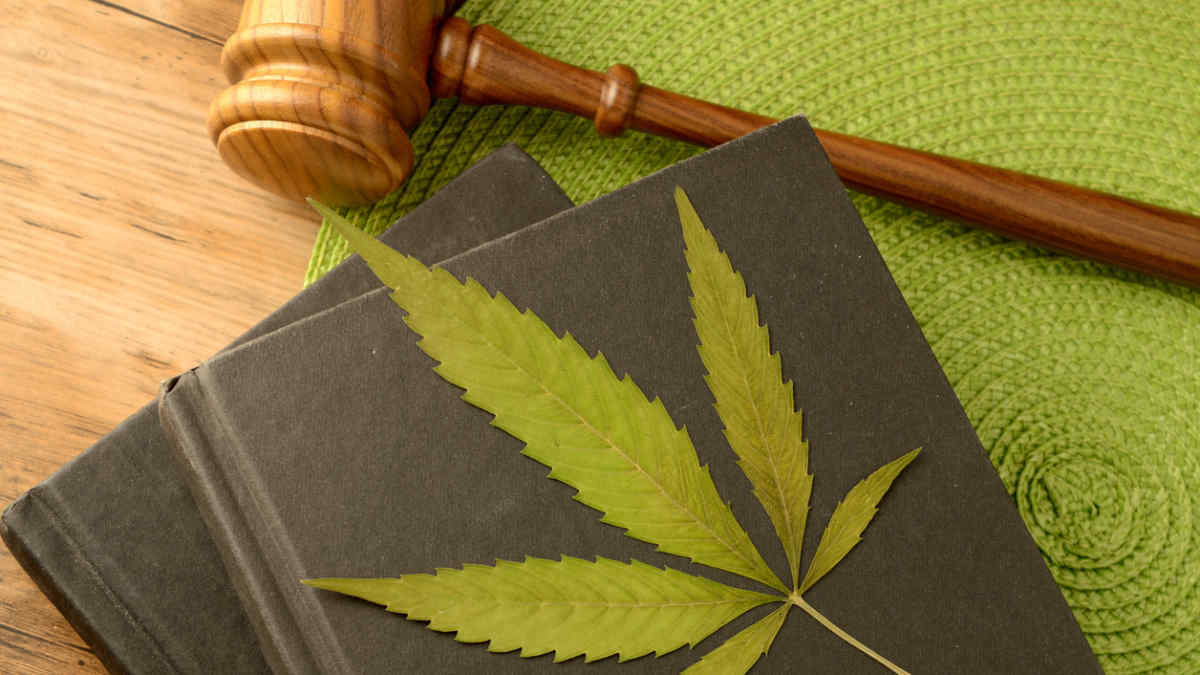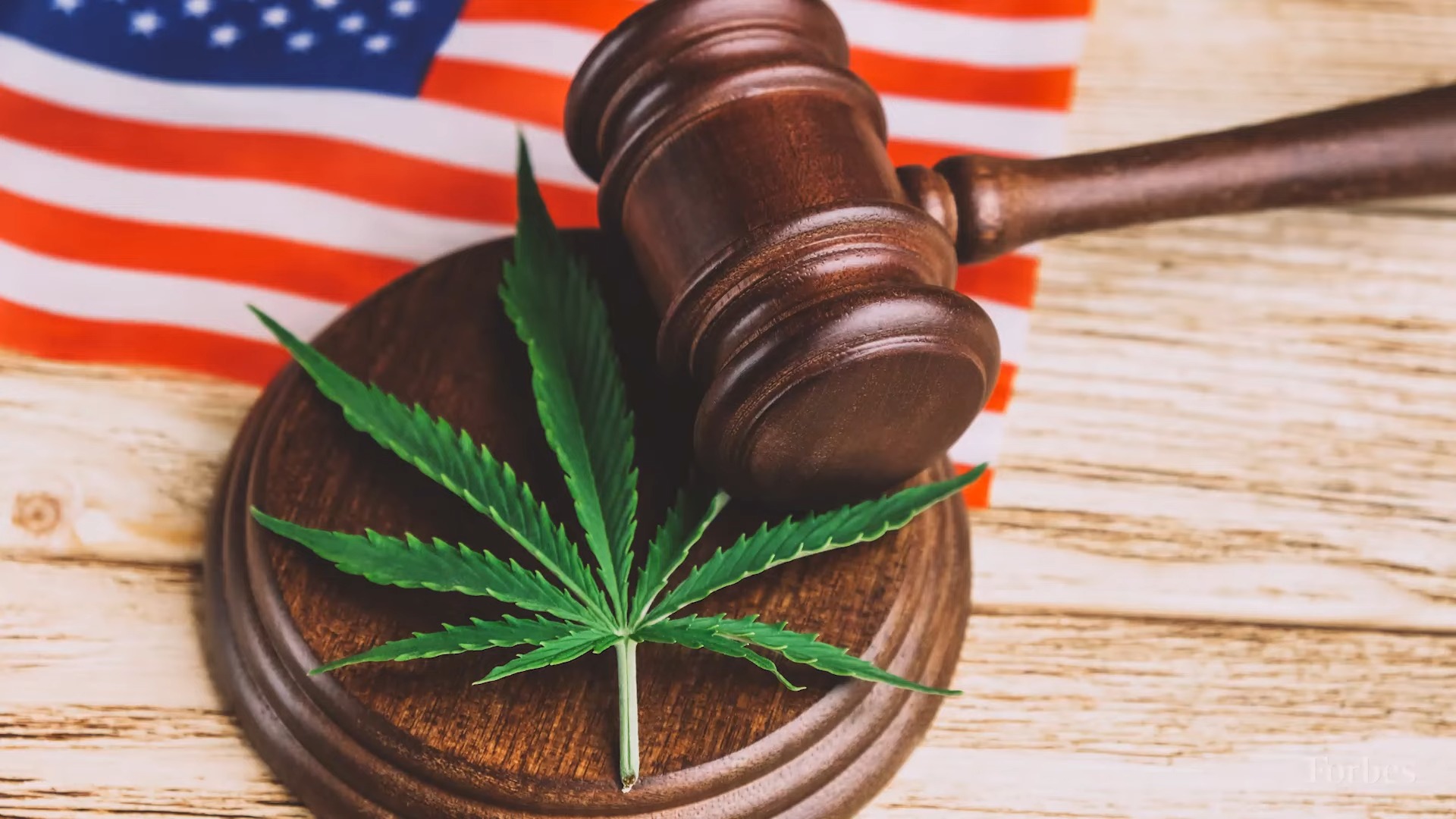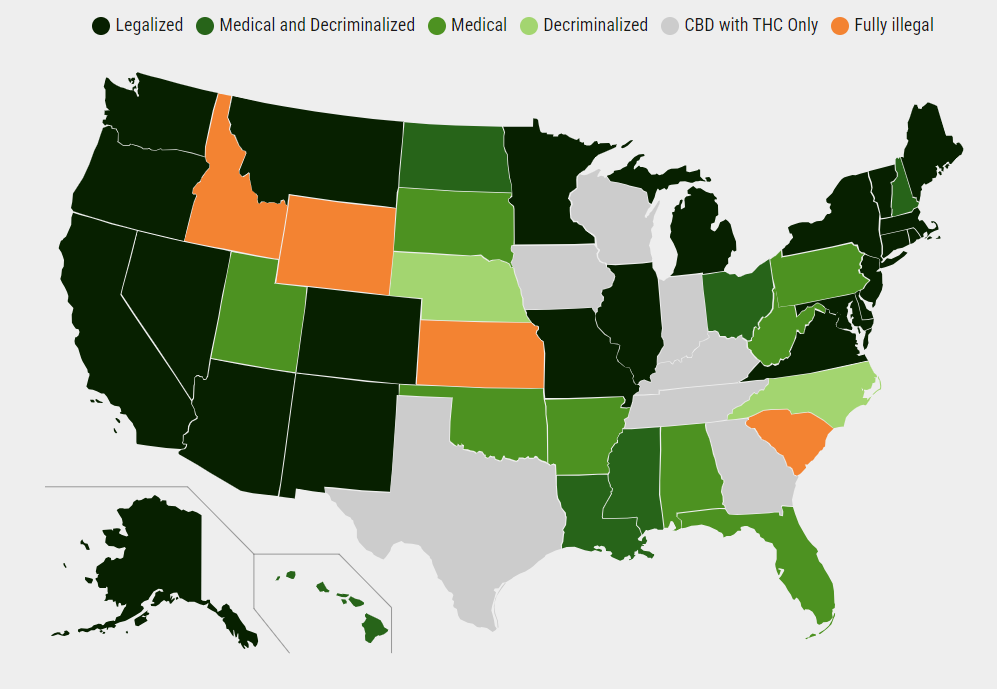Marijuana, a plant that has been at the center of controversy for decades, has seen a significant shift in its legal status across the United States in recent years. From being completely illegal and stigmatized, it has now been legalized for recreational use in numerous states. But where exactly is marijuana legal in the US as of 2024?
The Journey of Marijuana Legalization
On Election Day in 2012, Colorado and Washington became pioneers in the movement to legalize recreational marijuana. This bold step paved the way for many other states to follow suit.
I believe the journey of marijuana legalization is a testament to the power of public opinion and democratic processes. States are listening to their constituents, and it’s a positive step toward ending the decades-long war on drugs. However, we also stress the need for responsible use and robust regulatory frameworks to ensure public safety.
The Rise of Legalization
According to the Marijuana Policy Project, by 2024, a total of 26 states, Washington, D.C., and Guam have legalized the recreational use of marijuana. This rapid shift in policy can be attributed to the growing public support for legalization, despite marijuana’s illegal status at the federal level.
Some strains of the cannabis plant, often referred to as marijuana or weed, contain a psychoactive compound called THC. When ingested, THC produces a “high,” which has been both vilified and celebrated over the years.
Today, the call for marijuana legalization is not just a fringe movement. It has garnered mainstream support, especially among Democratic politicians. Some Republicans have also joined the chorus, advocating for the drug’s decriminalization or outright legalization.
Federal vs. State Laws
As I read on study of American Medical Association, marijuana remains illegal at the federal level, classified as a Schedule I drug under the Controlled Substances Act. This classification means the federal government views it as having a high potential for abuse and no accepted medical use. However, states have been pushing the boundaries, legalizing marijuana in direct conflict with federal law.
The federal government, for its part, has generally adopted a hands-off approach, especially when states have robust enforcement and regulatory mechanisms in place. The Cole Memorandum, issued by the Justice Department in 2013, was a significant policy document in this regard. It indicated that the federal government would not challenge state legalization laws. However, this memo was rescinded in 2018 by then-Attorney General Jeff Sessions.
The tension between federal and state laws on marijuana legalization is a significant concern for us. My point of stand is for a unified national policy to eliminate confusion and potential legal complications for users and businesses alike. The federal government should consider rescheduling marijuana to reflect its medical utility and lower abuse potential compared to other Schedule I substances.
States Leading the Charge
Pioneers in Legalization
- Colorado
- Washington
- Alaska
- Oregon
- Washington, D.C.
- California
- Maine
- Massachusetts
- Nevada
- Michigan
- Vermont
- Guam
- Illinois
- Arizona
- Montana
- New Jersey
- New York
- Virginia
- New Mexico
- Connecticut
- Rhode Island
- Maryland
- Missouri
- Delaware
- Minnesota
Each state has its unique set of regulations, from possession limits to taxation structures. For instance, in Colorado, adults over 21 can possess up to an ounce of marijuana and grow up to six plants. In contrast, Washington, D.C., allows possession but has not established a regulated recreational market.
Upcoming Legalization Efforts
According to U.S. News, Ohio is set to consider a ballot measure in November 2024 to legalize recreational marijuana. However, not all efforts have been successful. For instance, a similar measure in Oklahoma failed to garner enough votes in March 2024.
The Economic and Social Implications
The legalization of marijuana is not just about granting people the freedom to use the drug. It has significant economic implications. States have set up licensing processes for dispensaries, and marijuana sales are regulated and taxed, providing a new revenue stream.
Moreover, the social justice aspect cannot be ignored. Marijuana laws have historically disproportionately affected minority communities, leading to mass incarceration. Many states are now addressing this issue by including provisions for expunging past convictions related to marijuana offenses.
State-by-State Breakdown
| State | Legal Status | Medicinal | Decriminalized | State Laws |
|---|---|---|---|---|
| Alabama | Mixed | Yes | No | View State Laws |
| Alaska | Fully Legal | Yes | Yes | View State Laws |
| Arizona | Fully Legal | Yes | Yes | View State Laws |
| Arkansas | Mixed | Yes | No | View State Laws |
| California | Fully Legal | Yes | Yes | View State Laws |
| Colorado | Fully Legal | Yes | Yes | View State Laws |
| Connecticut | Fully Legal | Yes | Yes | View State Laws |
| Delaware | Fully Legal | Yes | Yes | View State Laws |
| District of Columbia | Fully Legal | Yes | Yes | View State Laws |
| Florida | Mixed | Yes | No | View State Laws |
| Georgia | Mixed | CBD Oil Only | No | View State Laws |
| Hawaii | Mixed | Yes | Yes | View State Laws |
| Idaho | Fully Illegal | No | No | View State Laws |
| Illinois | Fully Legal | Yes | Yes | View State Laws |
| Indiana | Mixed | CBD Oil Only | No | View State Laws |
| Iowa | Mixed | CBD Oil Only | No | View State Laws |
| Kansas | Fully Illegal | No | No | View State Laws |
| Kentucky | Mixed | CBD Oil Only* | No | View State Laws |
| Louisiana | Mixed | Yes | Yes | View State Laws |
| Maine | Fully Legal | Yes | Yes | View State Laws |
| Maryland | Fully Legal | Yes | Yes | View State Laws |
| Massachusetts | Fully Legal | Yes | Yes | View State Laws |
| Michigan | Fully Legal | Yes | Yes | View State Laws |
| Minnesota | Fully Legal | Yes | Yes | View State Laws |
| Mississippi | Mixed | Yes | Yes | View State Laws |
| Missouri | Fully Legal | Yes | Yes | View State Laws |
| Montana | Fully Legal | Yes | Yes | View State Laws |
| Nebraska | Fully Illegal | No | Yes | View State Laws |
| Nevada | Fully Legal | Yes | Yes | View State Laws |
| New Hampshire | Mixed | Yes | Yes | View State Laws |
| New Jersey | Fully Legal | Yes | Yes | View State Laws |
| New Mexico | Fully Legal | Yes | Yes | View State Laws |
| New York | Fully Legal | Yes | Yes | View State Laws |
| North Carolina | Fully Illegal | No | Yes | View State Laws |
| North Dakota | Mixed | Yes | Yes | View State Laws |
| Ohio | Mixed | Yes | Yes | View State Laws |
| Oklahoma | Mixed | Yes | No | View State Laws |
| Oregon | Fully Legal | Yes | Yes | View State Laws |
| Pennsylvania | Mixed | Yes | No | View State Laws |
| Rhode Island | Fully Legal | Yes | Yes | View State Laws |
| South Carolina | Fully Illegal | No | No | View State Laws |
| South Dakota | Mixed | Yes | No | View State Laws |
| Tennessee | Mixed | CBD Oil Only | No | View State Laws |
| Texas | Mixed | CBD Oil Only | No | View State Laws |
| Utah | Mixed | Yes | No | View State Laws |
| Vermont | Fully Legal | Yes | Yes | View State Laws |
| Virginia | Fully Legal | Yes | Yes | View State Laws |
| Washington | Fully Legal | Yes | Yes | View State Laws |
| West Virginia | Mixed | Yes | No | View State Laws |
| Wisconsin | Mixed | CBD Oil Only | No | View State Laws |
| Wyoming | Fully Illegal | No | No | View State Laws |
Colorado – Legalization Approved November 2012
According to the Denver Post, Colorado was one of the pioneering states to legalize recreational marijuana. Adults over the age of 21 can possess and give away up to an ounce of marijuana and grow up to six plants each. However, residences are limited to 12 plants total, regardless of the number of occupants. Public consumption remains illegal. Retail purchases at licensed dispensaries are subject to standard sales tax, plus an additional 10% marijuana sales tax. A 15% excise tax is applied to the wholesale price of retail marijuana.
Washington – Legalization Approved November 2012
According to the Seattle Times, in Washington, adults over 21 can buy and possess up to an ounce of marijuana, 16 ounces of marijuana-infused edibles in solid form, 72 ounces of marijuana-infused liquid products, and 7 grams of marijuana concentrates.
Public consumption is prohibited, and recreational users cannot cultivate plants at home. Retail sales at licensed dispensaries are legal, with a 37% excise tax imposed on those sales.
Alaska – Legalization Approved November 2014
Alaskan adults over the age of 21 can possess and give away up to an ounce of marijuana and can cultivate up to six marijuana plants, with a maximum of three mature plants. Public consumption remains prohibited. Retail sales are permitted at licensed dispensaries, with the state imposing an excise tax that cultivators are responsible for paying.
Oregon – Legalization Approved November 2014
Adults in Oregon aged 21 and over can possess up to an ounce of marijuana in public and up to 8 ounces at home. They can also have up to 16 ounces of a marijuana product in solid form, like an edible, or up to 72 ounces in liquid form. Personal cultivation of up to four cannabis plants is allowed.
Public consumption is illegal. Marijuana retail sales at licensed dispensaries are taxed at 17%, with cities and counties permitted to add an additional 3% tax in certain cases.
Washington, D.C. – Legalization Approved November 2014
As I read on Washington Post, in the nation’s capital, adults over 21 can possess up to 2 ounces of marijuana and gift up to 1 ounce.
They can also cultivate up to six marijuana plants, with a maximum of three mature plants. However, recreational cannabis sales remain illegal in D.C. due to Congressional restrictions. As a result, D.C.’s adult-use marijuana market relies heavily on “gifting” services.
California – Legalization Approved November 2016
According to the Los Angeles Times, in California, adults over 21 can possess, purchase, or gift up to an ounce of cannabis and up to 8 grams of concentrated cannabis.
They can also cultivate up to six live cannabis plants. Public consumption and use while driving remain prohibited.
Retail cannabis sales at licensed dispensaries are subject to standard state sales tax and an additional 15% excise tax. Local governments can also impose additional taxes on cannabis businesses.
Maine – Legalization Approved November 2016
Individuals over 21 in Maine can use and possess up to 2.5 ounces of marijuana and cultivate up to six flowering and 12 immature marijuana plants. A regulated retail market was launched in October 2020. Maine imposes a 15% excise tax and a 10% sales tax on marijuana.
Massachusetts – Legalization Approved November 2016
Adults over 21 in Massachusetts can possess up to an ounce of marijuana on their person and up to 10 ounces at home. Home cultivation is also permitted, allowing residents to grow up to six plants per individual and up to 12 plants for households with multiple adults. Sales at licensed dispensaries are legal and subject to standard state sales tax, a state excise tax of 10.75%, and municipalities can impose up to a 3% tax on marijuana sales.
Nevada – Legalization Approved November 2016
Nevadans over 21 can possess up to an ounce of marijuana and up to an eighth of an ounce of concentrated marijuana. Adults can also cultivate up to six plants, or 12 plants per household.
Public consumption and use in vehicles are prohibited. Retail sales at licensed dispensaries are legal and are subject to a 10% excise tax on top of the state sales tax.
Michigan – Legalization Approved November 2018
Adults over 21 in Michigan can grow, consume, and possess marijuana. The law permits individuals to cultivate up to 12 plants in a household and possess up to 2.5 ounces of the drug and 15 grams of concentrated marijuana.
The state’s Marijuana Regulatory Agency began accepting applications for retail licenses in late 2019. Michigan now operates licensed retailers for recreational cannabis use, as well as provisioning centers for medical use.
Vermont – Legalization Approved January 2018
While it was initially legal to grow and possess marijuana in Vermont, retail sales were not permitted until October 2022. Adults over 21 can possess up to an ounce of marijuana and cultivate two mature and four immature marijuana plants per household.
Guam – Legalization Approved April 2019
According to local news sources, adults over 21 in Guam can possess up to an ounce of marijuana and cultivate up to six plants, with a maximum of three mature plants.
Guam’s Cannabis Control Board has been working on establishing trading guidelines, with progress initially halted by the pandemic but has since made advancements in setting up its recreational market.
Illinois – Legalization Approved May 2019
According to Illinois.gov, starting January 2020, Illinois residents over 21 can possess 30 grams of marijuana, 5 grams of concentrated cannabis, and products containing up to 500 milligrams of THC.
Non-residents can possess half those amounts while in the state. Public consumption remains illegal.
Sales are taxed based on THC content, with cannabis exceeding 35% THC taxed at 25%. Cannabis-infused products are subject to a 20% tax, and local municipalities can impose up to a 3% tax on sales.
New Jersey – Legalization Approved November 2020
New Jersey voters approved a ballot initiative to legalize marijuana in 2020. The measure allows only adults over 21 to use cannabis and authorized the existing Cannabis Regulatory Commission to oversee the new adult market. The state allows possession of up to 6 ounces of marijuana.
Retail sales are subject to the state’s standard sales tax rate, and municipalities that host growers, manufacturers, or retailers can also levy a local tax.
Arizona – Legalization Approved November 2020
Adults over 21 in Arizona can possess up to an ounce of marijuana and cultivate up to six plants per household. The state began allowing sales in January 2021. Marijuana sales are subject to a 16% excise tax on top of the regular sales tax.
Montana – Legalization Approved November 2020
As reported by Billings Gazette, Montana residents over 21 can possess up to an ounce of marijuana and can cultivate up to four mature plants and four seedlings per household. The state began its retail sales in January 2022. Marijuana sales are subject to a 20% tax.
South Dakota – Legalization Approved November 2020
As per the Argus Leader, South Dakota had initially approved both medical and recreational marijuana in the 2020 election. However, the recreational measure faced legal challenges and was later struck down by the state’s Supreme Court. As of now, only medical marijuana is legal in South Dakota.
New York – Legalization Approved March 2021
According to the New York Times, adults over 21 in New York can possess up to 3 ounces of marijuana and can cultivate up to six plants per person, with a maximum of 12 plants per household.
Public consumption of marijuana is allowed wherever tobacco smoking is permitted.
The state plans to tax marijuana sales at a 9% state rate, with an additional 4% local tax and an excise tax based on THC content.
Virginia – Legalization Approved April 2021
Adults over 21 in Virginia can possess up to an ounce of marijuana and can cultivate up to four plants per household. Retail sales are expected to begin in 2024.
The state plans to impose a 21% tax on marijuana sales, with local municipalities allowed to add an additional 3%.
Connecticut – Legalization Approved June 2021
According to the Hartford Courant, adults over 21 in Connecticut can possess up to 1.5 ounces of marijuana and have an additional 5 ounces secured at their residence or in their vehicle’s trunk or glove box.
The state began its retail sales in 2022. Marijuana is subject to the state’s standard 6.35% sales tax rate, with an additional excise tax based on THC content.
New Mexico – Legalization Approved April 2021
A over 21 in New Mexico can possess up to 2 ounces of marijuana, 16 grams of extract, and 800 milligrams of edibles. They can also cultivate up to six plants per person or 12 per household. Retail sales began in 2022. The state imposes a 12% excise tax on marijuana sales, which will increase to 18% over several years.
Rhode Island – legalization approved May 2022
Rhode Island Gov. Dan McKee signed into law on May 25, 2022, a state legislature bill that legalizes, regulates and taxes cannabis in the state.
The law legalizes possession of up to an ounce of cannabis and cultivation of up to three cannabis plants in a private residence for adults 21 and older, according to the Marijuana Policy Project. Sales – overseen by a new regulatory commission – officially began in December 2022.
Maryland – legalization approved November 2022
Voters’ Election Day ballot approval of Question 4 paved the way for Maryland adults to possess and use cannabis as early as July 2024.
Companion legislation passed in the Maryland General Assembly stipulates that citizens would be allowed to possess up to 1.5 ounces, repeals the term “marijuana” and replaces it with cannabis, and offers a pathway toward expungement and resentencing for people convicted of certain cannabis offenses.
State lawmakers unveiled a bill in early February that details how Maryland would tax and regulate cannabis, according to Marijuana Moment.
Missouri – Legalization Approved November 2022
According to the Associated Press, Missouri voters gave the green light to recreational marijuana on Election Day 2022. The approved measure allows individuals to possess up to 3 ounces of marijuana.
The state, which had a high number of marijuana possession arrests between 2017 and 2021, now requires a registration card for “personal cultivation.”
A 6% tax is levied on the retail price of cannabis. Retail sales commenced on February 3, 2024, after the state health department expedited the approval of dispensary permits.
Delaware – Legalization Approved April 2024
Delaware Becomes 22nd State To Legalize Adult-Use Cannabis, Bypassing Governor’s Signature #Delaware #USA #law #legalization https://t.co/ehkAp7cczZ pic.twitter.com/226bvH3WRD
— Cannabis Culture (@CannabisCulture) May 11, 2024
In a unique turn of events, Delaware’s recreational cannabis bill became law on April 23, 2024, without the signature of Governor John Carney. According to the U.S News, while the governor had vetoed a previous legalization bill, he allowed this measure to pass, emphasizing that the state had more pressing concerns.
The law permits state residents aged 21 and older to possess up to 1 ounce of marijuana but prohibits personal cultivation. A separate bill, set to become law on April 27, 2024, establishes the recreational industry for Delaware, allowing the state to issue up to 30 initial retail cannabis licenses.
Minnesota – Legalization Approved May 2024
Democratic Governor Tim Walz signed a bill on May 30, 2024, making Minnesota the 23rd state to legalize recreational marijuana.
The law, which also provides for the expungement or resentencing of cannabis-related convictions, established a new government agency to oversee the industry.
Regulations include a 10% tax on recreational marijuana. While the decriminalization of certain amounts of cannabis for Minnesotans aged 21 and older starts on August 1, 2024, the actual retail cannabis industry will not launch until the first quarter of 2025.
Federal Stance on Marijuana
Marijuana remains a Schedule I drug under the Controlled Substances Act at the federal level. This classification means that the federal government views it as having no medical use and a high potential for abuse. Cultivating, distributing, and possessing marijuana violates federal drug laws. However, President Biden’s proclamation on October 7, 2022, called for a review of how marijuana is scheduled under federal law.
States that have legalized either recreational or medical marijuana have done so in direct conflict with the federal government. This tension between state rights and federal authority has been a significant point of contention.
The Cole Memorandum and Federal Enforcement
The Cole Memorandum, issued by the Justice Department in 2013, stated that the federal government would not challenge states’ legalization laws.
However, then-Attorney General Jeff Sessions rescinded this memo in 2018. Despite this, the Justice Department has generally refrained from prosecuting individuals complying with state law and has not challenged state legalization laws in court.
Decriminalization vs. Legalization
Decriminalization reduces the penalties for certain criminal acts or reclassifies them as civil offenses. As of September 2024, 31 states and the District of Columbia have decriminalized low-level marijuana possession offenses.
Decriminalization is seen as a middle ground between full-blown legalization and the strict drug policy that has disproportionately affected communities of color.
While decriminalization is a step in the right direction, I firmly believe that full legalization, coupled with a strong regulatory framework, is the most effective way to control the quality and safety of marijuana products. Decriminalization alone doesn’t address the risks associated with unregulated products and still leaves room for unnecessary arrests and convictions.
Public Opinion on Marijuana
Public opinion on marijuana has evolved significantly over the years. A CBS News/YouGov poll from 2022 revealed that two-thirds of Americans now support the legalization of recreational marijuana. This shift in perception indicates a growing acceptance of marijuana in American society, with both Democrats and Republicans showing support for its legalization.
The shift toward supporting marijuana legalization is encouraging, but it also comes with the responsibility to educate the public on safe and responsible use. I advocate for comprehensive public awareness campaigns to accompany any legalization efforts.
FAQ
What are the health risks and benefits of marijuana consumption?
While some studies suggest marijuana can relieve certain types of pain, reduce anxiety, and even stimulate appetite, it can also impair short-term memory, alter judgment, and impair motor coordination. Long-term or heavy use can have additional effects on mental health and cognitive function.
Can employers still drug test for marijuana in states where it’s legal?
Yes, employers can still conduct drug tests and maintain a drug-free workplace policy, even in states where marijuana is legal.
How does marijuana legalization affect driving laws?
Driving under the influence of marijuana remains illegal in all states, even those that have legalized its recreational use. Law enforcement might use blood tests, field sobriety tests, or other methods to determine impairment.
Can you travel between states with marijuana?
No, transporting marijuana across state lines remains a federal offense, even if both states have legalized its use.
How is medical marijuana different from recreational marijuana?
Medical marijuana is prescribed by a doctor for specific medical conditions. It might be subject to different regulations, tax rates, and potency limits than recreational marijuana.
Are there age restrictions for purchasing marijuana?
Yes, in states where recreational marijuana is legal, you must be 21 or older to purchase. Medical marijuana programs might have different age requirements.
How do states regulate the potency of marijuana products?
Regulations vary by state, but many have potency limits, especially for edibles. Some states require testing and labeling to ensure consumers are informed about the potency of the products they purchase.
Final Words
The landscape of marijuana legalization in the US is rapidly evolving, with states adopting a range of policies reflecting their residents’ beliefs and priorities. As the nation continues to grapple with the implications of these changes, it’s crucial to stay informed and understand the laws and regulations in your specific area. Always consume responsibly and be aware of the potential risks and benefits associated with marijuana use.
















